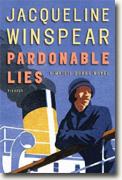Pardonable Lies
Jacqueline Winspear
book reviews:
· general fiction
· chick lit/romance
· sci-fi/fantasy
· graphic novels
· nonfiction
· audio books
· author interviews
· children's books @
curledupkids.com
· DVD reviews @
curledupdvd.com
newsletter
win books
buy online
links
home
for authors
& publishers
for reviewers

 |
Pardonable Lies: A Maisie Dobbs Novel Jacqueline Winspear Picador Paperback 384 pages June 2006 |
|
The dust-jacket of Pardonable Lies - in the sleek Art Deco style of 1930s posters promoting British ocean liners - raises expectations of a period mystery in which Agatha Christie’s Hercule Poirot might fit, though fussily, within the framework. The enigmatic woman leaning on the rail wears sensible navy blue, as favored by the “Psychologist and Investigator” of Winspear’s series. But is she meant to be Maisie Dobbs herself - up the social ladder from domestic service, successful in her chosen field, yet distant still (either in lucre or inclination) from leisure-class living?
Once beyond the portal of pleasing cover, it becomes clear quite soon that Maisie has, in Brit-speak, a lot on her plate. The walls protecting her from shattering memories are threatening to crumble as a result of sensitive investigations of two declared-dead soldiers whose family members need affirmations beyond the bureaucratic. This stirs flashbacks to her own ordeals, physical and psychological, as an underage World War I surgical nurse. The question becomes, will she be freed or crushed should the fortress of coping she has stoically built suddenly tumble? Naturally, it doesn’t ease her tension level to realize she is being shadowed by a deadly stalker - or that she has taken on the added burden of finding evidence to free an abused, sexually exploited child from a murder charge which could doom her to execution. Maisie’s compelling bio is, of course, the backbone of the series: consigned at thirteen to domestic servitude, educated through the efforts of benefactors, then mired while still in her teens within the slaughterhouse that France became in the years between 1914 and 1918. The story is set more than a decade after Armistice, but its events indicate that any sense of normalcy still eludes grieving survivors. Questions about the circumstances of a beloved brother’s death haunt Maisie’s once carefree school friend, Priscilla Evernden. Maisie cannot say no to helping her, though it involves a dreaded, trauma-evoking trip to France: “Reaching out, she touched one stone after another, each time feeling as if she were touching the very flesh of a soldier of the Great War. She fell to her knees and allowed the full weight of her terrible grief to break through the dam of self-will that had taken years to build.”Despite a fragile state, she completes her investigations. Priscilla could be told that her brother’s death came about as a result of a particularly valorous act and that, very near to where he died, Maisie’s friend would find a comforting link to him. To report on the soldier son of a renowned British barrister, Maisie first confronts a painful decision: should truth at times give way to a greater good that seems to lie in silence? She elects to hold back a discovered secret. “She delivered her final report to Sir Cecil Lawton and, though the meeting was brief, saw a man who was now at peace.” A series like this one has to be a weighty challenge. Could Maisie too easily turn ossified if her persona is not more fully humanized (i.e., narrative style and mode of speech less stilted, personal life less colorless, a whisper of humor occasionally infused)? Such a tweaking might also add depth to continuing characters like Maisie’s chum Priscilla, whose nervous vivacity and cigarette holder as dramatic prop is too remindful of the brittle, cliched mannerisms of Bette Davis in 1930s-era films. And if the smitten Dr. Andrew Dene is to figure in future Maisie adventures, readers might wish to know a bit more about him. More, that is, than the appealing way his unruly hair flops over his eyes. Originally published on Curled Up With A Good Book at www.curledup.com. © Norma J. Shattuck, 2006 |
|
|
|
 Click here to learn more about this month's sponsor! |
|
| fiction · sf/f · comic books · nonfiction · audio newsletter · free book contest · buy books online review index · links · · authors & publishers reviewers |
|
| site by ELBO Computing Resources, Inc. | |
 The pace of Maisie’s professional life alone points to the unlikelihood of her enjoying extended intervals of R&R at sea. She obviously, however, needs such a respite. At one point she suffers what today we’d call emotional/physical stress, but what then was likely labeled nervous breakdown. Still, the cover art is a pleasing introduction to the series for this particular lover both of British mysteries and of Deco style. Winspear’s prior titles, Maisie Dobbs and Birds of a Feather, won several mystery genre awards.
The pace of Maisie’s professional life alone points to the unlikelihood of her enjoying extended intervals of R&R at sea. She obviously, however, needs such a respite. At one point she suffers what today we’d call emotional/physical stress, but what then was likely labeled nervous breakdown. Still, the cover art is a pleasing introduction to the series for this particular lover both of British mysteries and of Deco style. Winspear’s prior titles, Maisie Dobbs and Birds of a Feather, won several mystery genre awards.